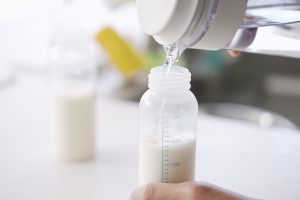Written by Praporn Churdsuwanrak, Dietetic Intern

The recent pandemic outbreak affects every life, infants included. With infant formula shortages nationwide, parents struggle to save their leftover formula. Parents feel they do not have a choice but to look for baby formula recipes online. Yet, many homemade recipes are not scientifically proven to be safe for babies.
Why must we be careful with baby formula? Well, formula can be a baby’s first source of nutrients. Without proper nutrition, unwanted health risks may follow them later in life. For these reasons, parents should be aware of the dangers of homemade formula.
Adding extra or too little water can cause serious health risks
Adding more water sounds tempting for parents to make the formula last longer. Adding too much water to baby formula lowers (or weakens) the calories infants need. This results in the “over diluted” formula. Fewer calories and nutrients in baby formula could:

- slow the baby’s growth,
- result in water intoxication, and
- cause electrolyte imbalance which may lead to seizures.
Not adding enough water to formula can also cause a baby’s health to be at risk. The water-formula ratio may not be proper for babies fed with homemade formulas. When a formula contains too little water, this results in an “under diluted” formula. Some of the health risks include:
- nutrients overload on infant’s kidneys, and
- dehydration (can lead to infections or fever if the infant has increased fluid needs).
It is best to buy FDA-approved formulas and to follow the directions on the container label or your doctor.
Your baby may not absorb needed nutrients from milk alternatives
Some online recipes may include milk alternatives, such as cow’s milk, raw milk, or plant-based milk. These recipes may seem healthier when using these alternatives. But, adding them to homemade recipes is dangerous for babies. The nutrients are hard for babies’ stomachs to absorb. Other health issues can happen when ingredients from these milk alternatives mix and interact. It is safer to offer your baby FDA-approved fortified cow’s milk or soy-based formulas.
Whole Cow’s milk
Cow’s milk has higher protein, sodium, and potassium, which is too much for a baby’s kidneys and liver. It also does not have enough iron, calcium, and vitamin E that a baby needs. For infants aged 6-12 months, there is no specific amount to limit cow’s milk consumption. For children over one year of age, 24 ounces is the limit.
Raw milk
Raw milk from cows, goats, or sheep have not gone through pasteurization. Pasteurization is a process that kills harmful germs with high levels of heat. Do not give your child raw or unpasteurized milk.
Plant-based milk
Plant-based milk includes milk that comes from soy, oat, rice, coconut, cashew, and almond. Babies under one year of age are not recommended to have plant-based milk. WIC offers soy-based formula products fortified with proteins, vitamin D, and calcium. FDA-approved soy-based formulas are safe options to commercial cow’s milk-based formulas. Choose fortified formula products designed to fit a baby’s nutrient needs. If your baby has special health needs, speak to a pediatrician to help you find the safest formula options.
Learn more about cow’s milk and the safety of other milk alternatives.
Tips to Remember

- Choose fortified formula products that meet federal safety standards which provide the right amount of nutrients for your baby.
- To safely prepare your baby’s formula, follow the directions on the container label or from your doctor.
- Contact WIC or your doctor if you can’t find your regular formula.
- Visit your doctors’ office and ask for free samples of formula, if available.
References
CDC. 2018 Dec 3. Fortified Cow’s Milk and Milk Alternatives. Centers for Disease Control and Prevention. https://www.cdc.gov/nutrition/infantandtoddlernutrition/foods-and-drinks/cows-milk-and-milk-alternatives.html
Cow’s milk – infants: U.S. National Library of Medicine MedlinePlus Medical Encyclopedia. medlineplusgov. [accessed 2022 Aug 4]. https://medlineplus.gov/ency/article/002448.htm#:~:text=To%20provide%20the%20best%20diet
How to Safely Prepare Baby Formula With Water. HealthyChildren.org. [accessed 2022 Aug 4]. https://www.healthychildren.org/English/ages-stages/baby/formula-feeding/Pages/how-to-safely-prepare-formula-with-water.aspx?_gl=1
Infant Nutrition and Feeding: A Guide for Use in the Special Supplemental Nutrition Program for Women, Infants, and Children (WIC). 2019. United States Department of Agriculture Food and Nutrition Service.
Is Homemade Baby Formula Safe? HealthyChildren.org. [accessed 2022 Aug 4]. https://www.healthychildren.org/English/ages-stages/baby/formula-feeding/Pages/Is-Homemade-Baby-Formula-Safe.aspx?_gl=1